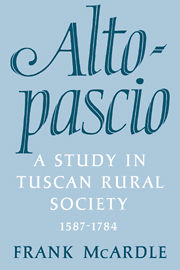Book contents
- Frontmatter
- Contents
- List of illustrations
- List of tables
- Acknowledgments
- Origins
- 1 The estate of Altopascio: village and villagers
- 2 Population
- 3 The economic organization
- 4 The economic performance, part I
- 5 The economic performance, part II
- 6 Familial organization
- 7 Class divisions
- 8 The local authority
- 9 The expression of grievance
- Conclusion
- Bibliography
- Index
9 - The expression of grievance
Published online by Cambridge University Press: 25 October 2009
- Frontmatter
- Contents
- List of illustrations
- List of tables
- Acknowledgments
- Origins
- 1 The estate of Altopascio: village and villagers
- 2 Population
- 3 The economic organization
- 4 The economic performance, part I
- 5 The economic performance, part II
- 6 Familial organization
- 7 Class divisions
- 8 The local authority
- 9 The expression of grievance
- Conclusion
- Bibliography
- Index
Summary
The bond between the villagers and the grand-ducal estate of Altopascio was comparable to that which might exist in a small industrial town where a single corporation dominates the lives of the residents. An idea of the community's identity can be drawn from its expression of grievance because therein lay the autonomous feelings of the community – independent reactions of groups and individuals which even this most powerful of landlords and the ruler of the state was unable to repress.
During these centuries of grand-ducal administration, three broad categories of expression most clearly articulated the grievances of the community: crime, violence, and out-right resistance.
Practically all the crime in this society was directly linked to the material condition of the criminal. The correspondence between Florence and Altopascio was very specific on this point. On 20 June 1716, for example, the Superintendent of the Royal Possessions in Florence wrote to the estate manager of Altopascio: ‘It does not surprise us that theft is continually on the rise in that part of the countryside, because the same is happening elsewhere, and the cause of it is the common misery.’
The prevalent crime was theft, which was difficult to prevent on the vast expanse of this estate, especially when the thieves were impoverished individuals acting out of desperation. In February 1695 the Royal Possessions reluctantly ordered the incarceration of Domenico Baccetti, who could not otherwise be stopped from stealing sticks and timber from the forest.
- Type
- Chapter
- Information
- AltopascioA Study in Tuscan Rural Society, 1587-1784, pp. 195 - 213Publisher: Cambridge University PressPrint publication year: 1978

